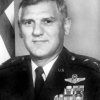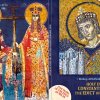Major General Chris O. Divich is commander of the Air Force Military Training Center, Lackland Air Force Base, Texas. A major component of the Air Training Command, the center is responsible for commissioning high-quality second lieutenants through the Officer Training School; conducting basic military training for all personnel entering the Air Force, Air Force Reserve and Air National Guard; providing technical training in nearly 100 courses; and providing English language training for foreign military personnel.
General Divich was born in Doland, S.D., in 1934, where he graduated from high school in 1952. He graduated from the University of Kansas in 1956 with a bachelor of science degree in education and received his commission through the Air Force Reserve Officer Training Corps program. He completed Squadron Officer School in 1960, Air Command and Staff College in 1967 and the Industrial College of the Armed Forces in 1976.
He entered the U.S. Air Force in September 1956 and in January 1958 completed pilot training at Reese Air Force Base, Texas. He served as a KC-97 pilot, aircraft commander and instructor pilot at Schilling Air Force Base, Kan., from March 1958 to October 1963. The general was then assigned to Dow Air Force Base, Maine, as a KC-135 commander and, later, standardization and evaluation pilot.
After completing Air Command and Staff College in June 1967, he served as an EB-66 pilot with the 41st Tactical Electronic Warfare Squadron, Takhli Royal Thai Air Force Base, Thailand. He flew 168 combat missions for a total of 575 combat flying hours.
Upon his return from Southeast Asia in October 1968, General Divich served as a pilot with the National Emergency Airborne Command Post at Andrews Air Force Base, Md. In May 1969 he transferred to the Office of the Air Force Chief of Staff and served as commander, Project Speckled Trout, from January 1972 to August 1975. He was responsible for worldwide transportation of the Air Force chief of staff. The general also directed a high-level research, development, test and evaluation program.
After graduating from the Industrial College of the Armed Forces in June 1976, General Divich was assigned to the Basic Military Training School, Lackland Air Force Base, as deputy commander. He became commander in August 1977.
From March 1979 to September 1981 General Divich served as commander of the 47th Flying Training Wing at Laughlin Air Force Base, Texas. He was then assigned as commandant of the Air Force Reserve Officer Training Corps at Maxwell Air Force Base. In June 1983 he became deputy chief of staff for operations, Headquarters Air Training Command, Randolph Air Force Base, Texas. He assumed his present command in June 1986.
The general is a command pilot with more than 8,000 flying hours in more than 20 different types of aircraft. His military decorations and awards include the Distinguished Service Medal, Legion of Merit with oak leaf cluster, Distinguished Flying Cross, Bronze Star Medal, Meritorious Service Medal, Air Medal with eight oak leaf clusters and Republic of Vietnam Gallantry Cross with Palm.
He was promoted to major general April 21, 1985, with date of rank March 1, 1981.
(Current as of Apri1 1987)





